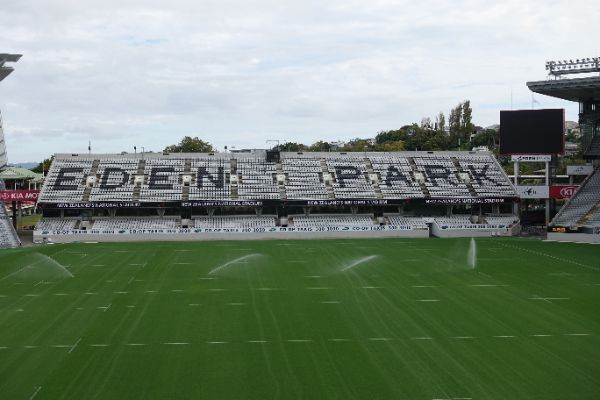Bore Saves Eden Park 11 Million Litres Of Treated Tap Water This Summer
Eden Park’s custom-built water treatment plant and reinstated bore has saved more than 11 million litres of treated tap water over its first summer in operation.
The bore and water treatment plant went into service in April last year, while Auckland was still recovering from the 2020 drought.
Watercare built Eden Park’s new treatment plant, storage tanks and a pump station to enable our national stadium to tap back into their groundwater source for field irrigation.

Eden Park turf manager Blair Christiansen is thrilled with the results.
“It takes a lot of water to keep our fields in pristine condition, so it’s awesome to be able irrigate them with the water underneath the park, instead of Auckland’s drinking water.
“This summer we’ve saved about 11 million litres of treated drinking water by using our reinstated bore and new treatment plant.”
Intensive irrigation on our two sports fields and cricket training areas usually lasts about 22 weeks from November through to the end of March.
“Our peak water use from the bore this summer was 127,000 litres a day,” Christiansen says. “It’s been a really reliable system and we’d love to see other sports turf venues investigating the use of groundwater as a sustainable irrigation solution long-term.”
Watercare chief customer officer Amanda Singleton is pleased to see Eden Park’s bespoke treatment plant and bore is achieving such substantial savings.
“The potential drinking water savings from reinstating Eden Park’s bore came to our attention because of the drought, but Auckland is going to reap the rewards of this initiative for decades to come.
“Eleven million litres is a huge amount of water – to put it into perspective, it would supply the water needs of about 22,000 Auckland homes for a day.
“Water is a precious resource so we’re always looking to unearth opportunities like this where sports fields can be beautifully maintained without using treated drinking water.”
Eden Park’s bore had been out of service since 2008 because sandy sediment and minerals were clogging up the irrigation system.
Watercare experts designed a custom-built treatment system with a mechanical filter to remove sand particles, a chlorine doser to remove manganese and iron, and six holding tanks. A booster pump then sends it to 300 sprinklers dotted around playing and practice fields as needed.


 Gordon Campbell: On The Making Of King Donald
Gordon Campbell: On The Making Of King Donald Auckland Council: Experienced Property Owners Convicted For Persistent RMA Breaches Across Auckland Homes
Auckland Council: Experienced Property Owners Convicted For Persistent RMA Breaches Across Auckland Homes EDS: Government Undermines Regional Powers To Protect Coastal Biodiversity
EDS: Government Undermines Regional Powers To Protect Coastal Biodiversity Greenpeace: Shane Jones Indicates NZ's Entire EEZ Now Open For Oil And Gas Free-for-All
Greenpeace: Shane Jones Indicates NZ's Entire EEZ Now Open For Oil And Gas Free-for-All Ngati Kahungunu Iwi Inc: Kahungunu Submission Rejects The Regulatory Standards Bill In Its Entirety
Ngati Kahungunu Iwi Inc: Kahungunu Submission Rejects The Regulatory Standards Bill In Its Entirety Fire and Emergency NZ: Older People Are More Likely To Die In A House Fire This Winter - Check They Are Fire Safe Today
Fire and Emergency NZ: Older People Are More Likely To Die In A House Fire This Winter - Check They Are Fire Safe Today The Reserve Bank of New Zealand: Statement from RBNZ chair Neil Quigley about OIAs on Adrian Orr's resignation
The Reserve Bank of New Zealand: Statement from RBNZ chair Neil Quigley about OIAs on Adrian Orr's resignation


